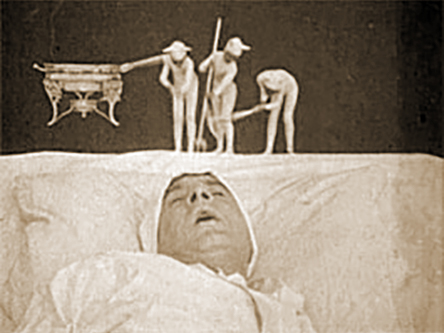| |
 |
| |
Frame enlargement: Silent Era image collection.
|
Dream of a
Rarebit Fiend
(1906) United States of America
B&W : 470 feet
Directed by Edwin S. Porter
Cast: John P. Brown [the fiend]
Edison Manufacturing Company production; distributed by Edison Manufacturing Company. / From the comic strip “Dreams of a Rarebit Fiend” by Winsor McCay. Cinematography by Edwin S. Porter. / © 24 February 1906 by Thomas A. Edison [H73985, H73986, H73987, H73988, H73989, H73990, H73991, H73992, H73993]. Released February 1906. / Standard 35mm spherical 1.33:1 format. / The film’s skyline panorama is identical to that in The Twentieth Century Tramp (1902).
Comedy.
Synopsis: [From Edison promotional materials] The opening picture shows a young man seated at a table in a restaurant. He has evidently been out for a good time with the “boys” and is winding up the night’s frolic with a Welsh Rarebit and a few bottles of Bass’ ale. After stuffing himself with the entire contents of the chafing dish, and washing it down with numerous glasses of ale, he starts for home somewhat the worse for wear. The exterior of the cafe is next shown. Presently the “Rarebit Fiend” comes out of the building. He stumbles and staggers along the street, but manages to keep on his feet by holding on to the iron railing in front of the cafe. Arriving at the corner of the street he endeavors to reach a friendly lamp-post. Everything is in a whirl. The buildings, trees, trolley cars and wagons are rapidly zig-zagging along the street, while the lamp-post sways and dances around. After many futile attempts the “Rarebit Fiend” finally succeeds in throwing his arms around the lamp-post and waves his handkerchief to imaginary companions. A diminutive policeman nows appears and realizing the young man’s condition endeavors to assist him. A rough and tumble wrestling match follows, but the “cop” finally manages to get him on his feet and starts him off for home. The next scene shows the young man entering his room with his shoes in hand and considerably under the weather after his night’s fun. After putting on his night shirt he climbs into bed, but is obliged to get up again and tie a wet towel around his aching head. He then lies down and the scenes which follow show his terrible dream. First his shoes mysteriously creep out of the room. Then the table and chairs become animated and quickly disappear to the dreamer's great astonishment. A close picture of the dreamer’s head on his pillow follows. A large steaming chafing dish suddenly appears over his head. Three little devils jump out and beat a lively tattoo on his head and pillow with pitchfork and shovel. The bed now comes to life and after going through a lively dance and spinning around the room like a top, ends it freakish actions by shooting out through the window. The next scene is a beautiful panorama, showing the bed sailing through the air high above the city, over bridges and rivers, and the dreamer desperately clinging to it. The “Rarebit Fiend” imagines he is in an air ship, and sitting up in the bed endeavors to steer it. A strong wind tosses him about, but he manages to hang on to the foot board of the bed, and trails along behind. Suddenly the bed makes a quick turn, which causes him to lose his hold and he falls down through the air until his night shirt catches on a weather vane on top of a lofty church steeple. The strong wind blows the weather vane rapidly round and round until his night shirt gives away and he once more plunges down through space, leaving a portion of his night shirt on the weather vane, which still continues to turn round. The final scene shows him crashing through the ceiling of his room and landing on his bed. This ends the nightmare, and the “Rarebit Fiend” tumbles out of bed on to the floor very much awake and realizes it was all a horrible dream. The different scenes are mono-tinted, producing the most beautiful effects. The picture is probably best described as being humorously humorous and mysteriously mysterious, and is certain to make the biggest kind of a “hit” with any audience. Some of the photographic “stunts” have never been seen or attempted before, and but few experts in photography will be able to understand how they are done.
Survival status: Prints exist in the George Eastman Museum film archive [35mm positive]; and in the film holdings of Film Preservation Associates [color-toned 35mm positive].
Current rights holder: Public domain [USA].
Keywords: Alcohol: Drunkeness - Demons - Devils - Dreams (Bad) - Furniture: Beds, Chairs, Tables - Miniatures - Panoramas - Trick cinematography - Visions
Listing updated: 7 March 2011.
References: Film credits, film viewing : Altman-Sound p. 100; Bohn-Light pp. xvii, 16; Fell-History pp. 25, 36, 47, 50; Kerr-Silent p. 50; Leyda-Before pp. 41, 69; Musser-Emerge pp. 458, 462, 478, 601; Niver-First p. 24; Sinyard-Silent p. 15 : Website-AFI; Website-GEM.
Home video: DVD.
|




































